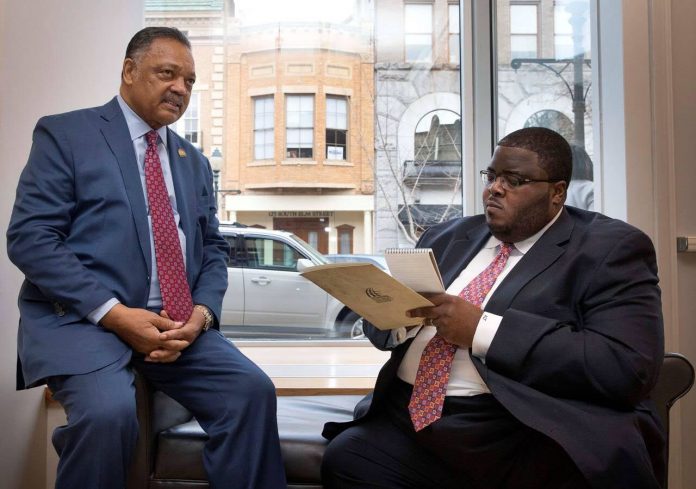Andre Taylor, the College of William and Mary’s oral historian, recognizes that every person he sees passing on the street has a unique story to tell, whether it be a news story, an obituary or a complex oral history.
“Oral histories are the collection of narratives from individuals that give vantage points that we have not examined throughout history. We have historical narratives,” Taylor said. “However, often those narratives of others who are at these historic events are never told. So, we give vantage points and give more insight and give a fuller narrative.”
Though many students may associate history with heavy textbooks carried around to classes, Taylor believes that history is composed of many sources and stories that come together to create a larger and honest narrative. For Taylor, oral history serves as an authentic representation of previously unheard historical perspectives.
“It’s very important to hear what others have to say, because once we close the door and close our ears to people, we have killed society,” he said.
This awareness of the fleeting nature of time drives Taylor to collect oral histories. After losing his grandfather, Taylor vowed to never let a chance to record history slip by him again.
“I lost his stories, I lost his voice, I lost his contribution to history and I vowed to never do that again,” Taylor said.
Taylor’s first collected oral history project was on the Tuskegee Airmen, the first African-American military aviators during World War II. He had the honor of meeting with veterans Alexander Jefferson and Charles McGee, an experience Taylor says he will never forget.
“[You could see] the pride when [McGee] told the story of how he became a Tuskegee Airman, you know it was,” Taylor said. “It was. You can see the joy, you can see the love, you can see the dedication.”
McGee passed away this January at the age of 102. Thanks to Taylor’s work, part of his history will be permanently preserved.
“I have his voice to listen to and to hear his story in his own words. Not something historians say, but his account of what happened, and if we don’t have their stories, what do we have left of them?” said Taylor.
While collecting an oral history, Taylor does not refer to the parties as “interviewee” and “interviewer,” they are the “narrator” and the “listener.”
“So, as you narrate your story, I just listen. I’m just an ear,” Taylor said. “I don’t say, ‘what? You shouldn’t say that.’ No, I empower you to tell your truth. And that’s the best part about oral histories. You get people to tell the truth.”
Taylor remarks that his interviews with the Tuskegee Airmen were nothing like the movie “Red Tails.” Whereas the cinema plays up a grandiose story for profit, the real oral history is so much more down-to-earth and awe-inspiring.
Taylor’s journey in oral history has led him to the College, where he sees a multitude of opportunities for the past, present and future to converge.
“How can you not be in this area and be collecting oral histories?” he said. “I mean, the stories that can come from families that existed here, exist here, and will exist here are amazing and bottomless.”
In Williamsburg, Taylor has done work with local churches, Colonial Williamsburg and James Monroe’s Highland.
One of his most standout undertakings is the Project 2024 which follows the class of 2024 from their unprecedented start at the College amid a pandemic to their graduation.
“They’re all in the same space, but they’re all in different places,” Taylor said. “They’re all seeing different things that not everybody is going to see. So, we now have a more cohesive, collective narrative for what it looks like for a student during a pandemic at William and Mary.”
Taylor remarks that he would like to see an official oral history program established at the College where students can directly contribute to the rich historical culture at the College by adding their own stories and stories of others.
“I want to see William and Mary become the place people come to to study oral histories, be it because we offer a lecture series, we offer a conference, or we create an entire department geared toward teaching people the methodology of oral history collection,” he said.
Taylor’s first piece of advice to prospective oral historians is to press the record button.
“Press record. Too often, we press record when the event is over. We have no recollection of it,” Taylor said. “I say actively be involved in a collection of history. Don’t just sit there and wait for somebody else to do it. Be an active component to collecting history.”
You can see Taylor’s most recent project on Black Greek Life in America currently on display in Earl Gregg Swem Library with QR codes that lead to recorded oral history interviews. His other work at the College will also be published on the Special Collections website in the coming weeks.
Taylor will continue to work with Special Collections to advance the gathering of oral histories that shed light on the College’s past, present and future.
“We’re telling stories. We’re giving people voices. We’re giving credence to communities. We are celebrating cultural heritage. We are celebrating life,” Taylor said. “Everybody has a voice, and it’s my job as the oral historian to give you that voice.”

